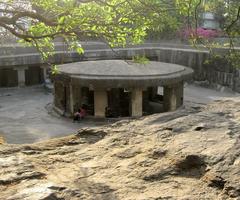Yerawada Central Jail Pune: Visiting Hours, Tickets, and Historical Significance
Date: 03/07/2025
Introduction
Yerawada Central Jail, located in Pune, Maharashtra, stands as one of India’s most prominent and historically significant prisons. Established in the late 19th century, Yerawada is renowned not only for its formidable architecture and role as a high-security correctional facility but also for its deep connections to India’s colonial past and the freedom struggle. Over the years, this sprawling complex has housed a range of notable figures—from stalwarts of India’s independence movement to high-profile contemporary inmates.
In recent years, the Maharashtra Prison Department has opened select parts of Yerawada Central Jail to the public through a guided heritage tour initiative. This move has transformed the jail into an important educational tourism destination, allowing visitors to delve into India’s political history, penal reforms, and ongoing rehabilitation efforts (ThePrint, Financial Express, The Hindu).
Table of Contents
- Introduction
- Architectural Layout and Design
- Institutional Organization and Security Protocols
- Historical and Heritage Significance
- Visitor Information
- Nearby Attractions in Pune
- Frequently Asked Questions (FAQ)
- Conclusion
- References
Architectural Layout and Design
Spread over approximately 512 acres, Yerawada Central Jail is designed in the panopticon model, which emphasizes surveillance and maximizes security. Its central watchtower offers guards unobstructed views of multiple wings. The main entrance is a massive stone gateway, reinforced and topped with barbed wire. Built primarily from local basalt and lime mortar, the jail’s robust and austere design is emblematic of colonial-era penal architecture (The Hindu, Indian Express).
Key Features:
- Main Gate & Watchtowers: Access is strictly controlled via a single, heavily guarded gate, with six watchtowers overseeing the perimeter.
- Cells & Barracks: The facility includes communal barracks, individual cells (including the infamous “Anda Cell” for high-risk inmates), and specialized areas for different inmate categories (Times of India).
- Administrative Blocks: Onsite offices, a hospital block, workshops for vocational training, and a large kitchen serving thousands of meals daily (Pune Mirror).
- Recreation and Rehabilitation: Exercise yards, religious gathering spaces, a library, and educational program areas promote inmate reform and well-being.
Institutional Organization and Security Protocols
Yerawada Central Jail operates under a strict classification system, segregating inmates by age, gender, crime type, and security risk, with dedicated wings for women, juveniles, undertrials, convicts, and high-profile prisoners (NDTV). Security measures include:
- CCTV and biometric access systems
- Regular surprise checks
- An emergency response team
A focus on rehabilitation is reflected in vocational training, literacy and cultural programs, and the unique “Gandhian Thought Examination,” inspired by Mahatma Gandhi’s incarceration here (Indian Express).
Historical and Heritage Significance
Yerawada’s Role in India’s Freedom Struggle
The jail played a critical role during the fight for independence, with its “Gandhi Yard” marking the site where Mahatma Gandhi was imprisoned and the historic Poona Pact was signed (LiveMint). Other notable freedom fighters and leaders detained here include Lokmanya Tilak, Jawaharlal Nehru, Sardar Vallabhbhai Patel, Sarojini Naidu, and Netaji Subhas Chandra Bose. Their preserved cells are a strong draw for heritage tours (Pune Mirror).
Executions and High-Profile Events
Historic executions, such as those of the Chapekar brothers (1899) and Ajmal Kasab (2012), have taken place here. The jail’s role in national security and justice continues to this day (ThePrint).
Visitor Information
Visiting Hours and Tickets
With the “Jail Tourism” initiative, guided tours are now available, subject to security and administrative protocols:
- Days: Tuesday to Sunday (Closed on Mondays and public holidays)
- Timings: 10:00 AM–4:00 PM (with designated morning and afternoon sessions)
- Entry Fee: No fee at present, though nominal charges may be introduced (Financial Express)
How to Arrange a Visit or Tour
- Eligibility: Group tours for schools, colleges, NGOs, and registered institutions only; individual tourists are not permitted currently.
- Booking: Applications must be submitted online at least one week in advance through the Maharashtra Prisons Department website.
- Group Size: Maximum of 50 visitors per group per day.
- Required Documents: Valid government-issued ID for all visitors.
Visitor Protocols and Restrictions
- No personal electronics (phones, cameras) or bags allowed.
- Photography is strictly prohibited unless authorized.
- Visitors must comply with frisking, health, and safety checks.
- No contact with inmates; tours are strictly supervised.
- Follow all instructions provided by prison authorities.
Accessibility and Travel Tips
- Accessibility: The tour route is wheelchair accessible; arrange any special requirements in advance.
- Getting There: The jail is about 7 km from Pune Railway Station and accessible via city buses, auto-rickshaws, and taxis. Private vehicle parking is limited.
- Dress Code: Modest, comfortable attire is recommended.
- Nearby Attractions: Combine your visit with nearby sites like Aga Khan Palace, Shaniwar Wada, and Pataleshwar Cave Temple.
Nearby Attractions in Pune
- Aga Khan Palace: Key site in India’s freedom movement.
- Shaniwar Wada: Historic city fortification.
- Pataleshwar Cave Temple: Ancient rock-cut temple.
- Raja Dinkar Kelkar Museum: Indian artifacts and heritage.
Frequently Asked Questions (FAQ)
Q1: What are Yerawada Central Jail’s visiting hours?
A: Tours run Tuesday to Sunday, 10:00 AM–4:00 PM. Closed on Mondays and public holidays.
Q2: Who can visit Yerawada Central Jail?
A: Currently, only organized groups from educational institutions and registered organizations may apply.
Q3: How do I book a tour?
A: Submit your application online at least seven days in advance via the official website.
Q4: Is photography allowed inside the jail?
A: No, unless specifically authorized by prison staff.
Q5: Is the site accessible for people with disabilities?
A: Yes, but visitors should inform authorities in advance for any special assistance.
Conclusion
Yerawada Central Jail is both a functioning prison and a living monument to India’s journey from colonial subjugation to independence and beyond. Its walls have witnessed seminal moments in the nation’s history, from the signing of the Poona Pact to the execution of high-profile convicts. The jail tourism initiative allows a new generation to engage with this legacy, offering an educational and reflective experience that complements the broader exploration of Pune’s historical landscape.
Plan ahead, respect the solemnity of the site, and take this opportunity to deepen your understanding of India’s enduring legacy of freedom and reform. For up-to-date information on visiting hours, ticketing, and protocols, consult the Maharashtra Prisons Department’s official website.
References
- Yerawada Jail Pune, The Hindu, 2022
- Yerawada Jail Architecture Heritage, Indian Express, 2022
- Yerawada Jail Anda Cell, Times of India, 2019
- Yerawada Jail Kitchen, Pune Mirror, 2020
- Yerwada Jail VIP Prisoners, NDTV, 2018
- Yerawada Jail Gandhian Thought Exam, Indian Express, 2020
- Yerawada Jail Gandhi Imprisonment, LiveMint, 2019
- Yerawada Jail Heritage Walk, Pune Mirror, 2020
- Yerawada Jail Freedom Fighters and Historical Significance, ThePrint, 2021
- Yerawada Jail Tourism Initiative, Financial Express, 2022
- Yerawada Jail Uncovered, The Daily Guardian, 2023
- Maharashtra Prisons Department Official Website




